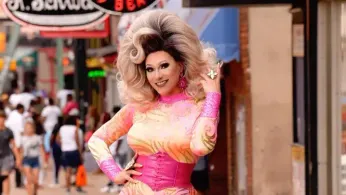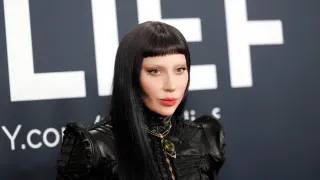
Aug 29
“Save the Queen”: New Documentary Chronicles Drag Artists’ Fight Against Anti-Drag Legislation
READ TIME: 3 MIN.
When photographer Jen Graylock first envisioned a “drag to riches” documentary, she imagined a behind-the-scenes exploration of drag artistry and personal transformation. But as anti-drag legislation swept state legislatures in early 2024 and 2025, her project quickly evolved into a more urgent chronicle: documenting the lives and careers of drag performers whose rights and livelihoods are under threat in the United States .
The resulting film, “Save the Queen,” centers on the personal and professional journey of Memphis-based drag queen and activist Bella DuBalle, whose story has become emblematic of the resilience and advocacy required of drag artists in this turbulent era .
In the past two years, at least eight states—including Tennessee, Texas, Missouri, and Arkansas—have introduced or enacted legislation that targets drag performances, often couched under the guise of protecting minors or restricting “adult entertainment” in public spaces. These bills typically define drag so broadly that they threaten not only drag shows but also transgender performers, musicians, and actors who challenge gender norms on stage .
According to PEN America, these legislative efforts are part of a wider movement to restrict free expression and LGBTQ+ rights, with some bills extending to ban performances by anyone presenting differently from their sex assigned at birth. “These bills would do more than just deter or ban drag performances. The bills often define drag as anyone performing in clothing or in a manner different from the gender assigned to them at birth,” PEN America noted in its 2025 report, warning of the chilling effect these laws could have on all forms of artistic expression .
At the heart of “Save the Queen” is Bella DuBalle, a classically trained Shakespearean actor who found both personal liberation and political purpose through drag. Now a prominent figure in Memphis’s LGBTQ+ community, DuBalle’s activism intensified as anti-drag bills threatened both her career and the safety of queer spaces. “Drag is my art, but it’s also my activism,” DuBalle explained in a recent interview. “We’re not just fighting for the right to perform; we’re fighting for the right to exist authentically and safely in our own communities” .
The documentary follows DuBalle as she organizes rallies, supports fellow performers facing harassment, and testifies at public hearings. Her journey echoes the experiences of drag artists nationwide, many of whom have faced increasing hostility and violence at performances and public events .
Behind “Save the Queen” is RonMar Productions, co-founded by Marcie Mule and Roni Selig. The production company’s mission is to create “content that matters”—stories that elevate marginalized voices and foster understanding. For Mule, who is an out lesbian, Graylock’s proposal resonated deeply. “We knew this story was bigger than one performer,” said Mule. “It’s about the collective struggle of artists, activists, and communities who refuse to be silenced” .
The documentary situates its narrative within a broader historical context of legislative attacks on LGBTQ+ expression. The rise in anti-drag bills mirrors earlier efforts to restrict LGBTQ+ rights, with drag performances and drag queen story hours in libraries becoming flashpoints for political and cultural battles .
These legislative attacks have been accompanied by a surge in protests at drag events, some of which have turned violent, underscoring the need for both legal protections and cultural solidarity. In Canada, parallel conversations are unfolding, with new proposals for legal “safe zones” to protect drag artists from hate crimes and harassment .
“Save the Queen” highlights the ways in which drag is both a form of artistic expression and an act of resistance. For DuBalle and her peers, visibility is power: “Every time we take the stage, we’re reminding the world that queer people are here, we have always been here, and we’re not going anywhere,” DuBalle told Out.com .
The film also explores the personal costs of advocacy. Many performers have faced economic hardship, public harassment, and threats to their safety. Yet, as DuBalle’s story demonstrates, the drag community continues to respond with creativity, solidarity, and hope.
As anti-drag laws face ongoing legal challenges, “Save the Queen” serves as both a rallying cry and a testament to the resilience of LGBTQ+ artists. National organizations such as PEN America and the Human Rights Campaign continue to advocate for the rights of performers, calling on allies to support artistic freedom and resist censorship .
For audiences, the documentary offers a window into the lived experiences behind the headlines—stories of joy, struggle, and the enduring power of self-expression. As RonMar Productions and Jen Graylock prepare to premiere the film at upcoming festivals, the message is clear: the fight for drag, and for queer visibility more broadly, is far from over.






